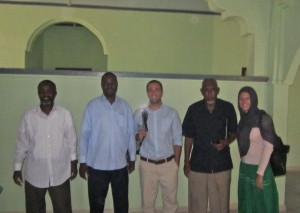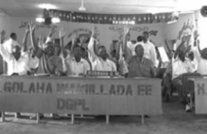Somali Family Services Meets with Electoral Commission
 GAROWE, Puntland (July 17, 2012) – On Saturday, Somali Family Services met with Puntland’s Transitional Electoral Commission to discuss the new constitution and prospective electoral law governing Puntland’s first-ever elections in 2014. SFS also explored new partnerships with the Commission to conduct voter education and coordinate larger programs to empower Puntlanders to demand responsive governance.
GAROWE, Puntland (July 17, 2012) – On Saturday, Somali Family Services met with Puntland’s Transitional Electoral Commission to discuss the new constitution and prospective electoral law governing Puntland’s first-ever elections in 2014. SFS also explored new partnerships with the Commission to conduct voter education and coordinate larger programs to empower Puntlanders to demand responsive governance.
Chairman Mohamed Bari, along with fellow members Mohamed Zibad and Abdirizak Shoole, outlined the Commission’s mandate to regulate political associations, design an electoral system for both regional and national representation, and administer the District Council elections set to be held next year.
Pending approval of the Commission’s electoral law by the Parliament – whose members will begin debate on the issue this week – political associations may legally register with the Commission beginning August 1. Under the prospective law, these associations must recruit 500 members from each of Puntland’s eight regions, submit a $15,000 USD application fee, and appoint a formal representative to liaise with the Commission. Only then will they be granted a place on the 2013 ballot.

Recognized associations will first compete for District Council seats within the eight regions. All associations must submit a distinct list of candidates for consideration in each electoral district, and every Puntland citizen over the age of 18 may submit one vote for one political association. The first five candidates on every list must include at least one from each gender. District Councils will apportion seats proportionally among the top three vote-receiving associations, each of which will then become registered by the State of Puntland as an official political party for the next ten years. No other formal political association, outside of these three parties, will be allowed to contest elections until the Commission re-opens the party system for fresh competition in 2023.
Voter participation in District Council elections will also determine the regional allotment of seats in the House of Representatives. Commissioners believe that the national body may remain at 66 members, but in the absence of an official census, the geographic distribution of representatives will depend upon voter turnout in all eight regions. Elections for the House of Representatives are set to take place a few months following the District Council polls, and will be held under the same system of closed-list, proportional representation.
To explore the potential role of political parties within Puntland’s new political system, as well as the impact women and media may have on the trajectory and pace of democratization, SFS is currently developing new reports to be published in the coming months.
For further information, contact Josh Linden at josh.linden@ussfs.org or visit our website at www.ussfs.org.
###
Somali Family Services is a non-governmental organization dedicated to fostering a peaceful and democratic Somalia through support of civil society, women, youth, and other marginalized groups






